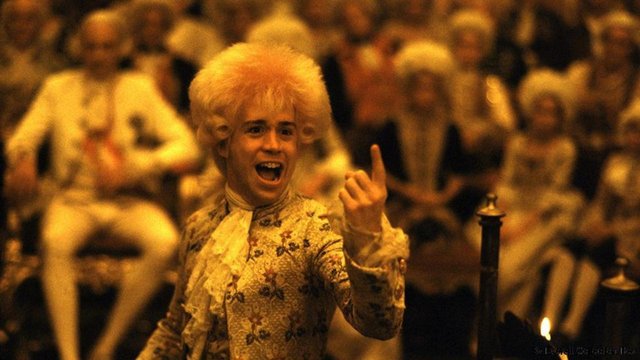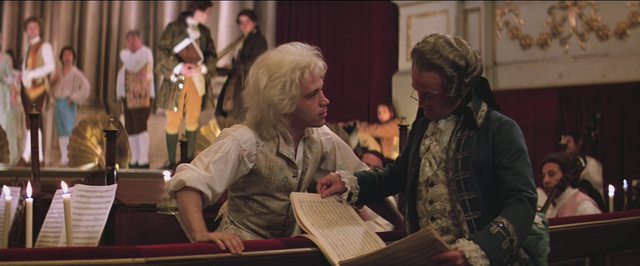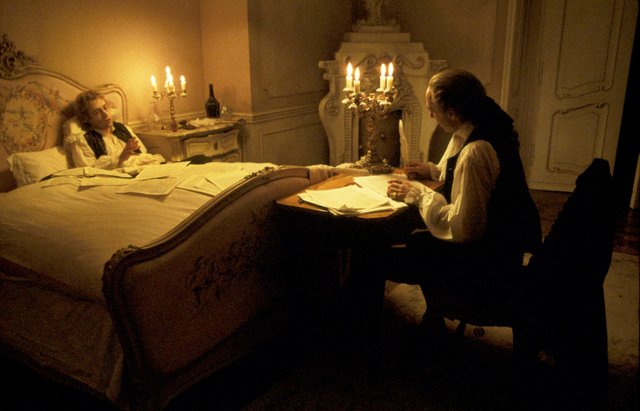/ Film Class #31 / Amadeus / Miloš Forman

After proving to the American audience with films One Flew Over the Cuckoo's Nest and Hair, Miloš Forman embarked on this ambitious and great bite of the screenplay of Peter Shaffer's drama Amadeus, about the life of one of the most famous composers in the world.
But Amadeus is not just a film about the genius and unconventionality of a composer, but also of jealousy and the lack of acceptance of one's own core of the other, the lesser known, leaving the viewers with the changed perception of music.
Antonio Salieri (Abraham Murray) tried to kill himself hysterically, screaming to Mozart to forgive his killer and eventually end up in a mental hospital, from where he tells the retrospective story about Mozart to the priest, and in fact his life story, moving from the earliest childhood. Salieri, like Mozart (Tom Hulce), received a gift from God for music. While Mozart is brought up to the highest levels, and with incredible ease he throws out a composition after composition, plays piano wih his eyes closed or turned upside down, Salieri's composer's gift is less developed than his fine taste and admiration of music.
Due to the awareness of his own mediocrity, Salieri undertakes to sabotage Mozart performances and all opportunities for financial success. Ironically, in the time in which both of them live Salieri is actually better respected and better financially covered, since he works for the emperor himself, while Mozart considers his contemporaries vulgar, inappropriate, and too innovative. The only reason Mozart is still alive is the dedication and practicality of his wife, Constanza (Elizabeth Berridge). Salieri ultimately brings Mozart into insanity recognizing his weak points, and acting as a friend and ally, which then results in the premature death of Mozart.

Forman and Tom Hulce created the character of a genius, but childish Mozart, who jointly worked with all the unpleasant situations with loud, soft laughter. He is playful, but unfit for everyday life and no one can tame him, even his own wife. It contrasts with everything and everyone around it, which is emphasized by costume design. Mozart's wig have pink shades and are reminiscent of footballers, and they move through the warm and romantic lighting of Vienna in the 17th century.
As a contrast to such a genius with a natural talent character, is the introducing character Salieri with big dreams, and with lesser abilities. He, as a child, promised God that he would compose and play only for him if he gave him a talent for music. Unlike Mozart, Salieri complies with the corrections, painstakingly and for a long time, and in the end, again, the composition turns out to be average. Although he lives comfortably and enjoys the respect of the emperor and his contemporaries, Salieri recognizes Mozart's gift and is therefore jealous of him. He resigns from his vow to God and dedicates himself to the destruction of Mozart, descending in fact on Mozart's childhood level, as emphasized by Salieri's great love for sweetness.

Although the name of the film is Amadeus, which suggests that the film is about Mozart, from the very beginning of the film, it is clear that we are seeing the demolition of Antoni Salieri's life story. It turns out that this title is Amadeus, even though he is unaware of his great roles in Salieri's life or Salieri's effect on his life. Salieri's obsession with Mozart could be called one of the main characters of the film, so strong and pronounced. As Salieri concludes the story with the persuasion in the present, the priest who listened to him is horrified and shocked, but Salieri no longer feels regret, but seems satisfied.
In the film we have the opportunity to hear some of the most famous Mozart's compositions, from Don Giovanni to the unfinished Requiem, and precisely the making of Requiem is one of the most intricate scenes in the film; weakened and feverish Mozart dictates Salieri's Requiem notes from the bed, and this one can barely follow Mozart's accelerated brain that thinks everyone understands what he wants to achieve. Thanks to this difference in terms of the characters, we get wonderful thoughts about music and its strong role in the life of man, whether coming from the mouth of Mozart or Salieri. The fact that after the release of the movie the sale of Mozart's music increased at a time when people rarely voluntarily listened to classical music sufficiently speaks of how Forman managed to bring closer to the viewer not only the composers, but also other characters embedded in the story of rivalry and music.
Note: this was my translation from croatian to english from article 'Ljubavno pismo klasičnoj glazbi' from portal Ziher hr by I.Kolar

I'm new for steemit please upvote me